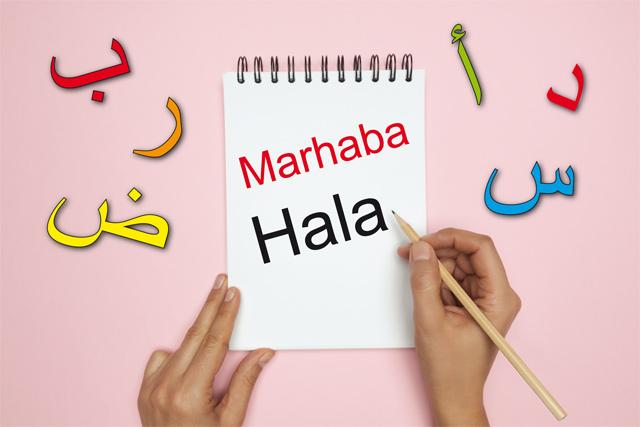You are here
Arabizi popularity threatening Arabic proficiency among native speakers, experts warn
By Mohammad Ghazal - Dec 18,2014 - Last updated at Dec 18,2014

AMMAN — When e-mailing, texting or even writing on her Facebook page, Hala Hamodeh rarely uses Arabic or English. She uses Arabizi, which is Roman character-based Arabic language slang.
Hamodeh, an employee at a humanitarian support NGO, uses Arabizi when tweeting and sending messages on WhatsApp because it is “a much easier language and fun to do”.
“My English is not very good and I find it more convenient to write in Arabizi than in Arabic. All my friends on social media and even on WhatsApp write in Arabizi. It is trendy and I am simply used to it,” the 25-year-old told The Jordan Times on Wednesday.
Fares Hajj Abed, a salesman, also likes using Arabizi as it is “nice and easier”.
“When I write to my friends in Arabic, they reply to me in Arabizi. I didn't like writing in Arabizi, but since many of my friends use it I became an Arabizi expert. I can no longer write proper and grammatically correct Arabic,” Hajj Abed said Wednesday.
The usage of Arabizi, which is common on social media and among young people in particular, is threatening the Arabic language, according to experts in the Kingdom, which marks World Arabic Language Day 2014 on Thursday.
Celebrated annually on December 18, this year's theme is “Arabic Calligraphy”, according to UNESCO.
“This malignant language is currently sweeping and jeopardising the Arabic language, especially since it is being used heavily over the Internet through various chat applications with the help of smart devices for texting,” Talal Abu-Ghazaleh, chairman and CEO of the Talal Abu-Ghazaleh Organisation, told The Jordan Times in a recent interview.
“The continuous use of 'Arabizi' by individuals, intentionally or unintentionally, is also a crime against our mother language; it must be stopped immediately in order to protect our Arabic heritage and culture,” Abu-Ghazaleh said.
“Arabizi should be regarded as a war against the Arabic language and a serious attempt to destroy it,” he added.
Experts said awareness among young Jordanians on the dangers of using Arabizi is crucial, especially with more than three million Facebook users, over 150,000 Twitter users and more than two million WhatsApp users.
“It is annoying to write in Arabizi. It affects youths' ability to write in Arabic. At our companies we hardly find graduates capable of writing professional Arabic. This is a serious problem,” said Marwan Juma, former ICT minister.
“People need to write in Arabic to increase Arabic content on the web,” he added.
As Arabic speakers account for 5 per cent of global Internet users, according to Google, and about 65 per cent of Arab Internet users look for Arabic content, experts said increasing online Arabic content, which ranges from 1-3 per cent on the Internet, is fundamental for spreading the use of Arabic in the region and in Jordan.
According to Google, half of the Arabic content on the Internet is replicated on different websites and written in weak Arabic.
“Arabic content on the web is very weak. The potential for increasing Arabic content is huge and the demand is high, especially with the spread of smartphones and more people using the Internet,” Juma noted.
At the end of September this year, the number of Internet users reached 5.6 million in the Kingdom, where there are more than 11 million active mobile subscriptions and smartphone penetration is over 50 per cent.
Jawad Abbassi, chairman of the ICT Association of Jordan, said digitising school and university curricula, as well as books at public libraries is an important way to increase Arabic content on the web.
“If we want scientific and accurate Arabic content on the web, [we] need to focus on this issue, which is also important to fight Arabizi, which is spreading like a cancer among social media users,” Abbassi stressed.
“Arabizi is a threat to both Arabic and English and its users will lose the ability to write in both languages,” he warned.
“Arabic language is our mother tongue and we have to protect it and spread its usage.”
On the occasion of World Arabic Language Day, Samsung Electronics Levant recently announced a new initiative “Baktob Bil Arabi” to enrich Arabic content online by encouraging the local social media community to use the Arabic language in their communication.
To mark this occasion, Samsung Electronics Levant is holding an event on Facebook, inviting users to use Arabic in their correspondence, and has designed special artwork for each letter allowing users to use it as a profile picture.
During its 190th session in October 2012, UNESCO’s executive board established December 18 as World Arabic Language Day. It marks the day in 1973 when the UN General Assembly included Arabic among its official and working languages.
Arabic is the language of 22 UNESCO member states and is one of the organisation’s official languages.
"It is one of the most widespread languages spoken by more than 422 million people, most of whom live in the Middle East and North Africa," the UNESCO website said.
Related Articles
AMMAN — Arabizi, a form of informal Arabic dialect transcribed using a combination of Latin script and Arabic numbers, is losing traction am
With the introduction of technology into our daily life and amid an identity crisis which faces the new generations, the emerging of Arabizi
AMMAN — Colloquial Arabic dominates the content of TV channels, newspapers and other media outlets, according to the Jordan Academy of Arabi

















